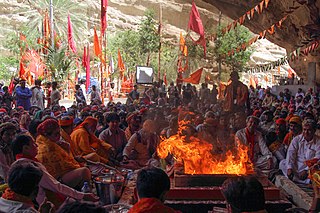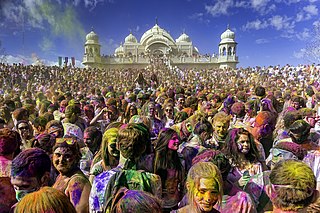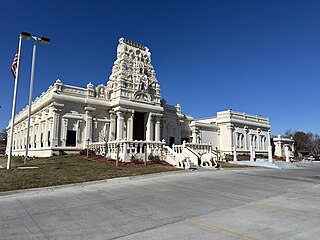
Hindus are people who religiously adhere to Hinduism. Historically, the term has also been used as a geographical, cultural, and later religious identifier for people living in the Indian subcontinent.

The International Society for Krishna Consciousness (ISKCON), known colloquially as the Hare Krishna movement, is a Gaudiya Vaishnava Hindu religious organization. It was founded on 13 July 1966 in New York City by A. C. Bhaktivedanta Swami Prabhupada. Its main headquarters is located in Mayapur, West Bengal, India.

The predominant religion in Brazil is Christianity, with Catholicism being its largest denomination.

Hinduism has been found in the Middle East since the early 16th century. Millions of members of the Indian diaspora, of different religions, reside and work in Arab states of the Persian Gulf; many of them are Hindu. Many came due to the migration of Indians and Nepalese expatriates and employees to the area around the Persian Gulf.
Modern-day Birmingham's cultural diversity is reflected in the wide variety of religious beliefs of its citizens. In the 2021 census, 70% of residents identified themselves as belonging to a particular faith, while 24% stated they had no religion and a further 6% did not answer the question.

Hinduism is the fourth-largest religion in Malaysia. About 1.78 million Malaysian residents are Hindus, according to 2010 Census of Malaysia. This is up from 1,380,400 in 2000.

Hinduism is the second largest religious affiliation in Pakistan after Islam. While Hinduism was one of the dominant faiths in the region a few centuries back, today Hindus account for only 2.14% of Pakistan's population or about 4.4 million people according to the 2017 Pakistani census. The Umerkot district has the highest percentage of Hindu residents in the country at 52.2%, while Tharparkar district has the most Hindus in absolute numbers at 714,698.

Hinduism is the fourth-largest religion in the United States, comprising 1% of the population, the same as Buddhism and Islam. The majority of American Hindus are immigrants, mainly from India, Nepal, Sri Lanka, and Bangladesh, with a minority from Bhutan, Pakistan, Afghanistan and other countries.

Adherents of Jainism first arrived in the United States in the 20th century. Jain immigration began in earnest in the late 1960s and continues to the present day.

Hinduism is the third largest religious group in the United Kingdom, after Christianity and Islam; the religion is followed by around 1.7% of the total population of the nation. Hindus had a presence in the United Kingdom since the early 19th century, as at the time India was part of the British Empire. Many Indians in the British Indian Army settled in the United Kingdom of Great Britain and Northern Ireland. According to 2021 United Kingdom census, 1,032,775 residents (1.7%) identified themselves as Hindus.

Hinduism is the third-largest religion in Canada, which is followed by approximately 2.3% of the nation's total population. As of 2021, there are over 828,000 Canadians of the Hindu faith.

The Sri Lankan Tamil diaspora refers to the global diaspora of Sri Lankan Tamil origin. It can be said to be a subset of the larger Sri Lankan and Tamil diaspora.

Christianity is the largest religion in England, with the Church of England being the nation's established state church, whose supreme governor is the monarch. Other Christian traditions in England include Roman Catholicism, Methodism, Presbyterianism, Mormonism, and the Baptists. After Christianity, the religions with the most adherents are Islam, Hinduism, Sikhism, Judaism, Buddhism, modern paganism, and the Bahá'í Faith. There are also organisations promoting irreligion, including humanism and atheism. According to the 2021 census, Shamanism is the fastest growing religion in England.

Hinduism in England is the third largest religion in the country, with over 1,020,533 followers as of the 2021 Census. This represents over 1.5% of the English population, up from 1.1% the previous decade. Hindus are predominantly in the cities of London and Leicester, where they make up greater proportions of the population. England has a number of Hindu temples, including the Hindu temple at Neasden which is a large Hindu temple in Europe. In 2007, the largest Hindu Mandir in the North of England, the Bradford Lakshmi Narayan Hindu Temple opened in Bradford, West Yorkshire.

Indo-Canadians or Indian Canadians, are Canadians who have ancestry from India. The term East Indian is sometimes used to avoid confusion with the Indigenous peoples of Canada. Categorically, Indo-Canadians comprise a subgroup of South Asian Canadians which is a further subgroup of Asian Canadians. According to Statistics Canada, Indians are one of the fastest growing communities in Canada and one of the largest non-European ethnic groups.
Religious discrimination in Pakistan is a serious issue for the human rights situation in modern-day Pakistan. Hindus, Christians, Sikhs, Shias, and Ahmadis among other religious minorities often face discrimination and at times are even subjected to violence. In some cases Christian churches and the worshippers themselves have been attacked. Although, there is very little record of this. Khawaja Nazimuddin, the 2nd Prime Minister of Pakistan, stated: "I do not agree that religion is a private affair of the individual nor do I agree that in an Islamic state every citizen has identical rights, no matter what his caste, creed or faith be".
Throughout its history the city of Houston, Texas has been religiously influenced by Protestant Christianity in the Bible Belt. Since the latter half of the 20th century, the Houston area has become home to many different religions in part to its large ethnic diversity, immigration, and refugee resettlement.

Hindu Temple of Omaha is a Hindu Temple in Omaha and serves the Hindu population of the Omaha Metropolitan Area. Many members of the Hindu Temple of Omaha are in Medical, Engineering and Computer Science fields within the Omaha area. Several members are also students studying at University of Nebraska and Creighton University. 98% of the member population is of Indian descent with the remaining 2% being Nepalese.

Hinduism is the dominant religion practised in the state of Assam. According to some scholars, it is home to some of the most complex and poorly understood traditions in Hinduism. People follow traditions belonging to Shaivism, Shaktism, Tantra, and an indigenous form of Vaishnavism called Ekasarana Dharma; taken together the practitioners constitute around 61% of the state population as per the 2011 Census. Hindus form a majority in 17 out of the 29 districts of Assam. By region, there is a significant diversity among the ethnic groups that profess the Hindu faith, traditions, and customs. As per as 2011 Census, In Brahmaputra valley of Assam, Hindus constitute 62% of the population, the majority being ethnic Assamese. In the autonomous Bodoland region of Assam, Hindus constitute 71.3% of the region's population, most being of the Bodo tribe. In the Barak valley region of southern Assam, Hindus constitute 50% of the region's population, most being ethnic Bengalis. The Hill Tribes of Assam, particularly the Karbi people of Karbi Anglong and Dimasa people of Dima Hasao, are mainly Animism.
















